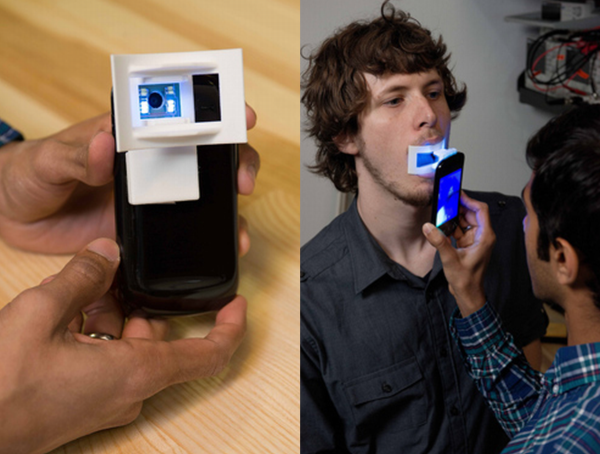Due to insufficient number of dentists in remote areas of developing countries, detecting cases of oral cancer becomes a challenge. Even though oral cancer is not lethal, many people succumb to the disease as adequate medical aid is not available. To counter this problem, a savvy student duo, Dhruv Boddupalli and James Clements, has developed the OScan oral scanner. Inputs of assistant bioengineering professor Manu Prakash also went into the device. The output was an affordable and intelligent smartphone enabled gadget. The easily accessible device, available for use all the time, is capable of early diagnosis.

The device applies a simple mechanism to solve a festering problem. The smartphone is actually capable of examining a person’s mouth thoroughly. Detailed images of the oral cavity are taken by the device. Also, it screens a patient’s mouth for any suspicious lesions. The whole process is simple and a number of people can get their mouths scanned easily with it. These images can then be sent wirelessly to surgeons, dentists or health care professionals anywhere in the world. Moreover, the whole process saves cost as well as time. Dentists will not be required to visit patients. On the contrary, doctors will be able to tackle cases from different locations at the same time.
The compact device is about the size of a pack of gum. The composition holds a mouth positioner, two rows of fluorescent light emitting diodes and a circuit board. This arrangement can easily be attached to the built in camera of any smartphone, which by all means is a really neat trick. An operator will carry out the entire process for you. Oscan needs to be swiped across the mouth of the patient. The camera will then take high resolution and panoramic images of the person’s oral cavity. A blue fluorescent colored illumination used by the device will highlight malignant cancer lesions as dark spots.
There is acute need in the market for such a device. Oral cancer is one of the most common types of cancer. It is widespread in many countries like Sri Lanka, Pakistan, India and many regions of South Asia. More than 40 percent of cancer related deaths in India can be attributed to this disease. The high tobacco consumption in India is one of the prime causes of the malady. Approximately, 57 percent males and 11 percent women are into the habit. It’s not surprising therefore that oral cancer is responsible for thousands of deaths every year in developing countries. Dentists are in short supply around rural areas. In fact, there is less than one for every 100000 people.
The product has a simple design and the material cost required for mass production of the piece is also very low. It’s no wonder therefore that the intellectual gadget has bagged awards. It has won grants like Vodafone Americas Foundation Wireless Innovation Project and also the mHealth Alliance Award. Field testing and viable software application for the product are being carried right now. The $250000 of prize money received will also be used in the testing process. The intelligent product, which omits the need to conduct traditional dental checkups, is truly godsend.
Via: MedicalXpress